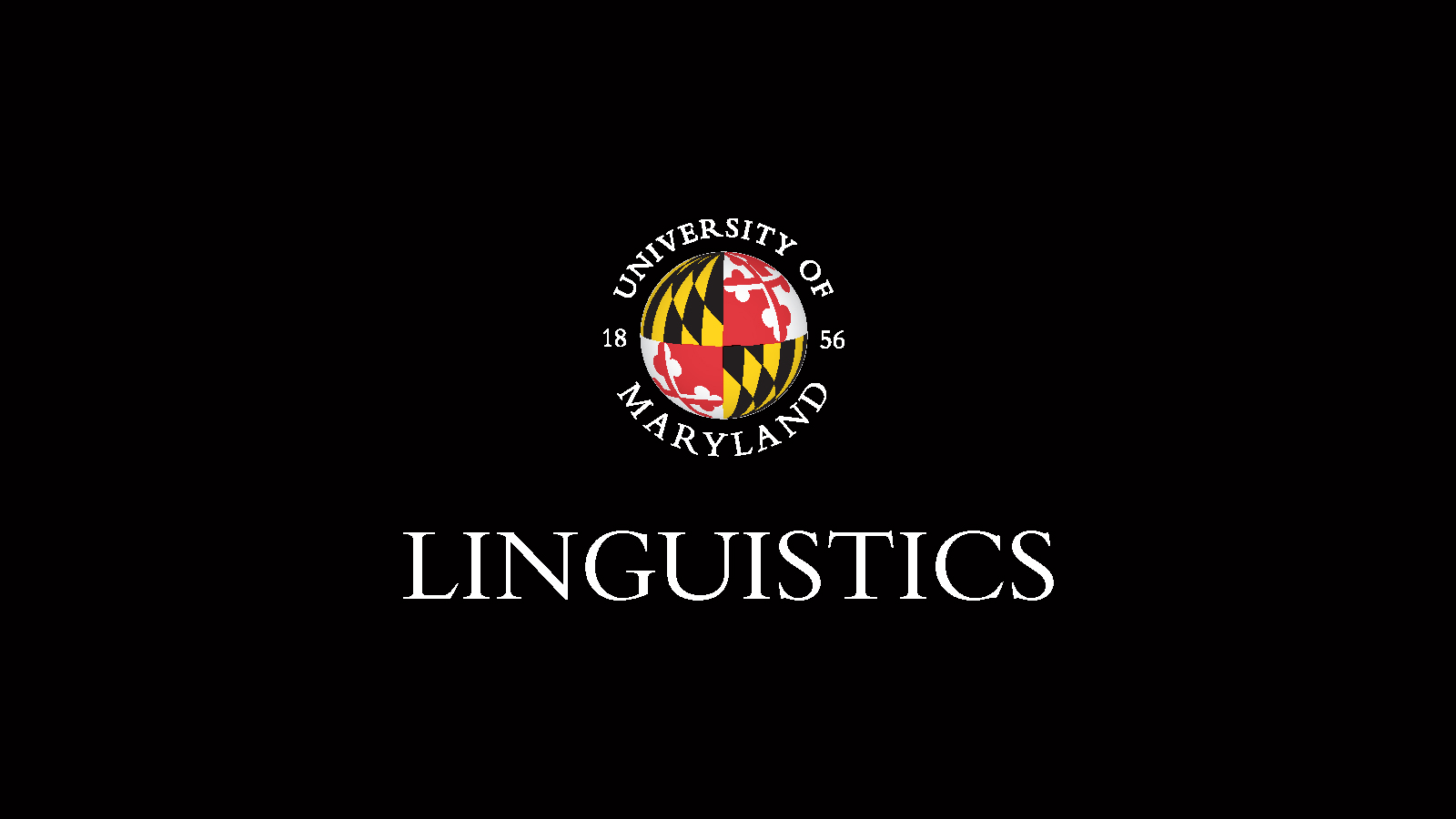Terps roll through Boulder
March 22, 2019

At CUNY in Colorado, it's Terps all the way down.
At CUNY in Colorado, it's Terps all the way down: Zoe Ovans, Tyler Knowlton, Phoebe Gaston, Hanna Muller and Chia-Hsuan Liao; RAs Aura Cruz Heredia and Lalitha Balachandran; Bob Slevc, Colin Phillips, Ellen Lau, Jeffrey Lidz, Paul Pietroski and Yi Ting Huang; alumni Alexis Wellwood, Brian Dillon, Dan Parker, Dave Kush, Dustin Chacón, John Drury, Masaya Yoshida, Matt Wagers, Shota Momma, Wing Yee Chow and Zoe Schlueter; past postdocs Ming Xiang and Martin Hackl; former RAs Bethany Dickerson, Christopher Hammerly, Jon Burnsky, Margaret Kandel, Tom Roberts and Shayne Sloggett; and past visitors including at least Alex de Carvalho, Iria de Dios Flores, Matt Husband and Jesse Harris.Talks * Zoe Ovans, Kathleen Oppenheimer, Yi Ting Huang, Online parsing strategies are influenced by verb-specific and language-general biases * Tyler Knowlton, Jeffrey Lidz, Justin Halberda and Paul Pietroski, The mental representation of universal quantifiers: evidence from verification * Kerianna Frederick and Yi Ting Huang, Sentence-planning strategies in adults who stutter: An eye-tracking study * Margaret Kandel, Cassidy Wyatt, Lalitha Balachandran and Colin Phillips, Number attraction effects in production: Errors and speech rate profiles narrow a production-comprehension contrast * Jeffrey Geiger and Ming Xiang, A probabilistic account of VPE interpretation in context * Shota Momma, Masaya Yoshida and Victor Ferreira, Structure before content: long-distance dependency in sentence production * Jennifer Bellik and Tom Roberts, Verbatim memory for surface features: Evidence from stress shift
Posters * Chia-Hsuan Liao and Ellen Lau, Computing complex events and beyond: ERP data on prediction with complex verbs * Hanna Muller, Iria de Dios Flores and Colin Phillips, Not (just) any licensors cause negative polarity illusions * Phoebe Gaston, Ellen Lau and Colin Phillips, Facilitation vs. inhibition as mechanisms for syntactic constraints on word recognition * Aura Cruz Heredia, Bethany Dickerson and Ellen Lau, Sustained negativities for wh-movement may not extend to other types of syntactic prediction * Yi Ting Huang, Kathleen Oppenheimer and Zoe Ovans, Developmental parsing across SES: Trade-offs between cue reliability and input quantity * Eli Kane and L. Robert Slevc, Evidence for integration of noisy linguistic evidence and prior expectations depends on the task * Dave Kush, Ashley Lewis, Andrew Jahn, Luca Campanelli, Clinton L. Johns and Julie Van Dyke, Active antecedent search in cataphora processing: Insights from neural oscillations * Dave Kush and Anne Dahl, Learning subtle syntactic constraints in L2: Evidence from Norwegian-English bilinguals * Anna Giskes and Dave Kush, Antecedent Retrieval during the Processing of Dutch Reciprocal Pronouns * Zoe Schlueter, Chris Cummins and Antonella Sorace, Pragmatically (ir)rational: loss aversion bias in L2 speakers of English * Dan Parker and Adam An, Facilitatory interference reflects direct-access retrieval * Steven Foley and Matt Wagers, Computing object agreement in Georgian is easier than computing subject agreement * Alexandra Krauska and Masaya Yoshida, Covert Structure and Zero Morphology in Sentence Processing * Nayoun Kim, Alexis Wellwood and Masaya Yoshida, Object Who is processed differently from Subject Who, Why and How * Nayoun Kim, Laurel Brehm, Patrick Sturt and Masaya Yoshida, Different Types and Qualities of Fillers: Maintenance and Retrieval * Kathleen Hall and Masaya Yoshida, Online processing and interpretation of verb phrase ellipsis * Kathleen Hall and Masaya Yoshida, Online processing of an elided r-expression * Annika Kohrt, Peter O'Neill, Trey Sorensen and Dustin Chacón, Semantic effects on processing filler-gap dependencies into adjuncts and conjuncts * Jamie Linert and Dustin Chacón, Thematic fit and grammatical constraints in good enough parsing * Wing-Yee Chow, Di Chen and Suiping Wang, Immediate revision of disconfirmed predictions: Evidence from Eye-tracking and ERPs * Brian Dillon, Long filler-gap dependencies can make a main verb analysis less tempting * Caroline Andrews, Brian Dillon and Adrian Staub, Fool me once: Readers Adapt to NP/Z garden paths but not ORCs * Thuy Bui and Brian Dillon, Structure-sensitive pronoun processing even in the absence of Principle B effects * Sakshi Bhatia and Brian Dillon, Agreement attraction in a mixed agreement system: Evidence from Hindi * Vishal Sunil Arvindam and Brian Dillon, Fine-grained gender typicality systematically modulates anaphora resolution: Evidence from eye movements * Erika Mayer, Brian Dillon and Adrian Staub, The (non-)influence of even’s likelihood-based presupposition on lexical predictability effects * Aniello De Santo and John Drury, Generalized Quantifiers and Working Memory: Disentangling Encoding from Verification * Jon Burnsky and Adrian Staub, Cloze completions reveal misinterpretation of noncanonical sentences * Christopher Hammerly, Brian Dillon and Matt Wagers, Reassessing the grammaticality asymmetry in agreement attraction: An ROC analysis * Shayne Sloggett, Amanda Rysling and Adrian Staub, Linguistic focus as predictive attention allocation * Naomi Francis, Leo Rosenstein and Martin Hackl, L1 acquisition of polarity sensitivity: The case of "either" and "too" * Eszter Ronai and Ming Xiang, Relative clause processing in a flexible word order language: Evidence from Hungarian * Juliane Schwab, Ming Xiang and Mingya Liu, Anti-locality effects without verb-final dependencies * Jeffrey Geiger and Ming Xiang, Inferable constituents are not deaccented: Phonetic and perceptual evidence * Sherry Yong Chen, Leo Rosenstein and Martin Hackl, Facilitation effects of QUD and event type on negative sentences * Alexandra Lawn and Jesse Harris, Similarity-based interference and morphological retrieval in Portuguese sluiced sentences * Stephanie Rich and Jesse Harris, Thinking ahead has its limits: Structural prediction with correlative and quantificational "both" * Chie Nakamura, Jesse Harris and Sun-Ah Jun, Listeners’ belief about the speaker and adaptation to the deviant use of prosody * Jesse Harris, Chie Nakamura, Bethany Sturman and Sun-Ah Jun, Prosody-meaning mismatches in PP ambiguity: Incremental processing with pupillometry * Luis Hildebrandt-Belmont and E. Matthew Husband, Quantifiers, Restrictors, and Illusory NPI Licensing * Sherry Yong Chen and E. Matthew Husband, Comprehending the presupposition of too: the effects of distance and interference * Guorong Zhang and E. Matthew Husband, Garden-Path Misinterpretation in Reading While Listening * Alex de Carvalho, Cécile Crimon, Anne Christophe and John Trueswell, 24-month-olds (and adults) exploit negative sentences to constrain their interpretation of novel word meanings

